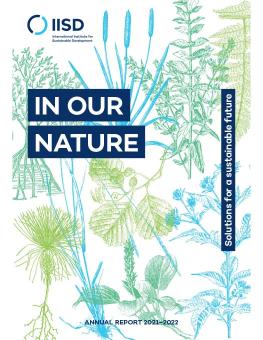
IISD Annual Report 2021–2022
In Our Nature: Solutions for a sustainable future
IISD knows that, together, we can do hard things. Our annual report for 2021–2022 highlights key accomplishments toward our vision of a world where people and the planet thrive, including a special focus on how we're tapping into the power of nature.
Increasingly, we're seeing just how connected we, as people, are to our natural environment—we make an impact on nature and biodiversity every day, and those impacts come right back to us. We already know the negative consequences of this loop.
But we can also see the potential—of protecting nature, investing in nature, building with nature, and learning from nature. Whether it is safeguarding coastal communities from the impacts of climate change by building sand dunes rather than artificial barriers or purifying a local lake with cattails instead of chemical filtration systems, we are seeing time and again that nature has many of the solutions we need.
Today, our greatest hurdle is scaling up these solutions fast enough, both locally and across the globe, to prevent truly dire consequences for humanity. This part is trickier, but it's where IISD comes in.
We know that by acting together and engaging across sectors, we can create lasting change for the better. That is why we are looking forward to new projects and new partnerships, as well as doing all we can to tap into the power of nature—for people and the planet.
You might also be interested in
National State of the Environment Report: Uzbekistan
The National State of the Environment Report (NSoER) is a comprehensive document that provides a snapshot of current environmental trends in Uzbekistan's socio-economic development for citizens, experts, and policy-makers in the country of Uzbekistan.
What Is the UAE Framework for Global Climate Resilience, and How Can Countries Move It Forward?
With the introduction of the new framework for the Global Goal on Adaptation (GGA), COP 28 marked a milestone for adaptation. We unpack key outputs and set out how countries can move forward by strengthening their national monitoring, evaluation, and learning (MEL) systems.
Ottawa supports Big Oil over the climate
One can only imagine the positive buzz these days inside the boardrooms of Canada's oil companies, as they rake in record profits and plan major expansions of their oil production. Amid all the good cheer, one could easily lose sight of the fact that those plans will push the world dangerously closer to the brink of irreversible climate chaos. Even as the world finally signed a commitment at UN climate talks last month to begin transitioning away from fossil fuels, Canada's major oil companies are poised to do exactly the opposite — to greatly expand their fossil fuel production.
Essential Monitor's Guide for Prairie Water Retention
This guidance document aims to make water retention monitoring a more accessible practice from a technical standpoint by demystifying some of the considerations required to get started.